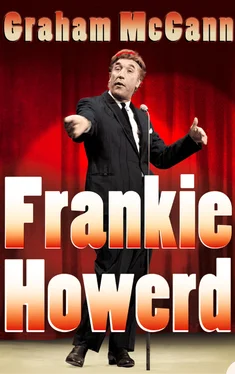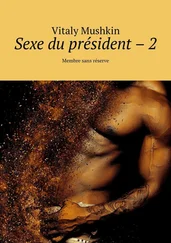Howerd, however, was the one who set the fresh trend. His decision to adopt such an extraordinarily âordinaryâ pose and persona back in the considerably less flexible show-business world of the mid-twentieth-century took real wit, imagination and guts. While his contemporaries remained content to step back and soak up the applause, he chose to step forward and make a connection.
That was his real achievement, his great achievement. Frankie Howerd really did make a difference. He was so much more than the casually patronised âcultâ figure, âcampâ icon and Carry On fellow-traveller who, according to far too many of the predictably trivial posthumous tributes and all of the tiresome tabloid nudges and winks, bequeathed us little more than a handful of over-familiar sketch shows and sitcoms, a few quaintly hoary catchphrases (all of which, thanks to their increasingly robotic repetition, have long since calcifìed into mirthless cliché) and a dubious fund of dusty double entendres. 3
Frankie Howerd â the real Frankie Howerd â was truly special. A brilliantly original, highly skilful and wonderfully funny stand-up comedian â whose talent and impact were as prodigious and profound, in their own way, as those of Bob Hope, Jack Benny or any of the other internationally recognised greats â he deserves to be remembered, respected and celebrated as such.
Consider the extraordinary career: stretching all the way from the late 1940s to the early 1990s, and encompassing everything from the demise of music-hall and the rise of radio to the supremacy of television and the emergence of home video. Howerd stamped his signature upon each one of the media he mastered.
Consider, too, the incredible comebacks: written off by the producers, the press and more than a few of his fellow-performers on not one, not two, but on three profoundly harrowing and humiliating occasions, he returned each time not only to recover all of his old fame, fans and professional pride, but also to find himself a fresh generation of followers. Seldom has there been such a frail yet faithful fighter.
Consider, most of all, the exceptional craft. One critic called the on-stage Howerd âa very clever man pretending not to beâ, and few descriptions could have been more apt. His comedy turned the traditional tapestry upside down: we were shown only the messiness â merely the âumsâ and the âersâ and the âahsâ â while the elaborate pattern â what Howerd liked (in private) to call âa beauty of delivery, a beauty of rhythm and timing â like a piece of musicâ 4 â was kept well-hidden.
He acted more or less how most of us felt (and feared) that we would act, should we ever find ourselves forced into the spotlight up there instead of staying hidden in the dark down here. All of the key ingredients of Britainâs peculiar post-colonial character â the defiant amateurism, the nagging self-doubt, the public primness and the private sauce â were caught squirming in the spotlight, stuffed inside a badly-fitting brown suit topped off by an exhausted-looking toupee.
The implicit admission was unmistakeable: âIâm afraid Iâm just not up to this job!â The phases of failure were similarly familiar: the nerve would falter, the words would fail and the half-hearted gags would invariably fall horribly, hopelessly flat. No one born British was ever moved to wonder why there was so much âOh no !â in the show, and so little âOh yes !â That was life. That was our life.
Most, if not all, of the humour sprang from this world-weary acceptance of our own insurmountable imperfection. Whereas âproperâ performers would always insist on being allowed to entertain you, Frankie Howerd was prepared to advise you to please yourselves.
The net effect was the creation of one of the most openly, endearingly, reassuringly human performances that modern comedy has ever produced. Every grumble, every groan, every grimace and every sudden solemn squeak of admonition would coax from us one more furtive snigger of recognition. We knew what he knew, and what he knew was us.
Howerd knew our sort all right. It is time now for us to get to know him.
Nervy â that was me. Nerves were the only thing that came easily.
Poor soul.
If we were to begin where Frankie Howerd would have wanted us to begin, we would be five years out of date. According to all of his own public accounts, 1 Frankie Howerd (whose proper surname, incidentally, was spelt âHowardâ) was born on 6 March 1922. In truth, he was not: being painfully aware of the age-based prejudices of his own precarious profession, he arranged, in the first of many self-inflicted imprecisions, to have his real infancy erased.
The authentic beginning had actually arrived back on 6 March 1917, when Francis Alick Howard â the first child of the 30-year-old Francis Alfred William Howard and his 29-year-old wife, Edith Florence Morrison â was born in the City Hospital in York. An early photograph recorded the sight of a broad-browed, blown-cheeked and somewhat reproachful-looking baby, with a downy dome of fair hair, a pair of large protruding ears, and a mouth already puckered up into the now-familiar outraged pout (âI was,â the famous adult would always insist, âquite beautifulâ 2 ).
The Howardsâ first family home was situated at 53 Hartford Street, a small but rather smart red-bricked terraced house not far from the city centre in the Fulford district of York. Both parents, right from the start, went out to earn a wage. Francis Snr was a private in the 1st Royal Dragoons; following in the footsteps of his father (a former sergeant at the Royal Military College at Sandhurst), he served as a staff clerk. 3 Edith, meanwhile, laboured long and hard as a âcream chocolate makerâ at the local Rowntree confectionery factory.
Before their child had the chance to acquire any real awareness of his loose northern roots â the solitary memory to survive to later life, apparently, would be of him tumbling down some stairs and bumping his head 4 â the family was obliged to move down south. In the summer of 1919, when the baby Francis had reached the age of two-and-a-half, his father was transferred to the Royal Artillery, promoted to sergeant and posted to the Woolwich Barracks at Greenwich in south-east London.
The need for the switch had been accepted with some enthusiasm by the newly-elevated Sergeant Howard, who recognised that he was not only taking a modest but none the less welcome step up the professional ladder, but was also, as someone Plumstead born and bred, on his way back to a place that struck him as so much more like âhomeâ. The acceptance of such a rude upheaval almost certainly came rather harder, however, to his wife, Edith, whose entire life, up until this point, had been lived in close proximity to her mother, father and seven siblings within the confines of the comforting walls of York.
The Howardsâ new family home was located at 19a Arbroath Road in Eltham (which in those days was a relatively quiet and rural area situated on the borders of London and Kent). Once the Howards had actually settled in, however, it soon began to feel like a home without a family. The problem was that Frank Snr had to spend his weekdays based six miles away at the Royal Artillery barracks, while Edith was left on her own in an unfamiliar environment to bring up their infant son. Although the ostensible head of the household would duly return, with his wage packet, each weekend to be with his wife, the stark contrast in their newly separate styles of life â his brightened by the clarity of its routine and the quality of its camaraderie, hers dulled by a creeping sense of loneliness and a palpable loss of purpose â would in time breed tensions deep enough to shake the base of the bond between them.
Читать дальше












